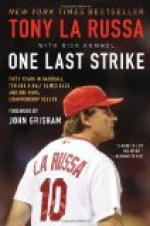Joel was hard worked. He was used not only to wriggle around the line inside of ends and to squirm through difficult outlets, but to charge the line as well, a feat of which his height and strong legs rendered him well capable. He proved a consistant ground-gainer, and with Blair, who worked like a hero, and Kingdon, who won laurels for himself that remained fresh many years, gained the distance time and again. But although the spectacular performances belonged here to the backs, the line it was that made such work possible. Chesney, with his six feet four and a half inches of muscle, and his two hundred and twenty-nine pounds of weight, stood like a veritable Gibraltar of strength. Beside him Rutland was scarcely less invulnerable, and Murdoch, on the other side, played like a veteran, which he was not, being only a nineteen-year-old sophomore, with but one hundred and sixty-seven pounds to keep him from blowing away.
Selkirk gave way to Lee when the half was two thirds over, but Burbridge played it out, and then owned up to a broken shoulder bone, and was severely lectured by the trainer, the head coach, and the doctor in turn; and worshiped by the whole college. Captain Dutton played a dashing, brilliant game at left end, and secured for himself a re-election that held no dissenting vote. And Barton, at the other end of the red line, tried his best to fill the place of the deposed Chase, and if he did not fully succeed, at least failed not from want of trying. But it was little Story, the quarter-back, who won unfading glory. A mass of nerves, from his head down, his brain was as clear and cool as the farthest goal post, and he ran the team in a manner that made the coaches, hopping and scrambling along on the side lines, hug themselves and each other in glee. So much for the Harwell men.
As for Yates, what words are eloquent enough to do justice to the heroic, determined defense she made there under the shadow of her own goal, when defeat seemed every moment waiting to overwhelm her? Every man in that blue-clad line and back of it was a hero, the kind that history loves to tell of. The right guard, Morris, was a pitiable sight as, with white, drawn face, he stood up under the terrific assault, staggering, with half-closed eyes, to hold the line. Joel was heartily glad when, presently, he fell up against the big Yates center after a fierce attack at his position, and was supported, half fainting, from the field. The substitute was a lighter man, as the next try at his position showed, and the gains through the guard-tackle hole still went on. Yates’s team now held four substitutes, although with the exception of Douglas, the substitute right-guard, none of them was perceptibly inferior to the men whose places they took.
The cheering from the Harwell seats was now continuous, and the refrain of “Glory, glory for the Crimson!” was repeated over and over. On the east stand the Yates supporters were neither hopeless nor silent. Their cheers were given with a will and encouraged their gallant warriors to renewed and ever more desperate defense. The score-board proclaimed the game almost done. With six minutes left it only remained, as it seemed, for Yates to hold the plunging crimson once more at the last ditch to keep the game a tie, and so win what would, under the circumstances, have been as good as a victory.




